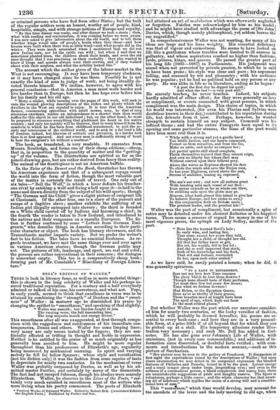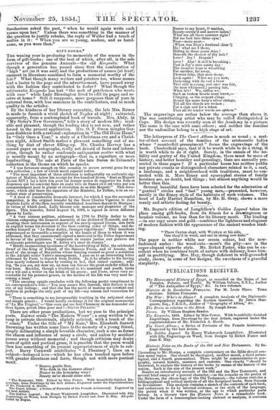BELL'S EDITION OF WALLER. * THERE is luck in literary fame,
as well as in more material things : this is shown in the long celebrity of Waller and his perhaps as- sured traditional reputation. For a century and a half everybody admired or talked of his ease, his correctness, and what not. Pope, in early youth, seemed to think that excellence in verse was to be attained by combining the "strength " of Denham and the " sweet- ness" of Waller : in matures age he diminished his praise by changing the epithet to " smoothness," and speaking of that slightly.
" Waller was smooth; but Dryden taught to join The varying verse, the full resounding line, The long majestic march and energy divine."
This smoothness after all was exaggerated, at first through compa- rison with the ruggedness and carelessness of his immediate con- temporaries, Donne and others. Waller has some limping lines; very many are only verses tested by the fingers; they are con- tinually affected or trifling in thought and feeble in expression. Neither is he entitled to the praise of so much originality as has generally been ascribed to him. He might be more regular throughout than his predecessors of Elizabeth's age, regularity being measured by mechanical scanning. In spirit and varying melody he fell far below Spenser; whose style and -versification (not his diction only) it was the fashion from some caprice of taste to depreciate for nearly two centuries. In the mechanism of verse Waller was probably surpassed by Davies, as well as by his ad- mitted master Fairfax, and certainly by many of the dramatists. The fact had not escaped Johnson, though his studies were scarcely Elizabethan. Waller, he observes in the Lives of the Poets, " cer- tainly very much excelled in smoothness most of the writers who were living when his poetry commenced. The poets of Elizabeth
• Poetical Works of Edmund Waller. Edited by Robert Bell. [Annotated Edition the English Poets.] Published by Parker and Son.
had attained an art of modtilation which was afterwards neglected or forgotten. Fairfax was acknowledged by him as his model; and he might have studied with advantage the poem of [Sir John] Davies, which, though merely philosophical, yet seldom leaves the ear ungratified." In comprehensiveness Waller was not wanting, for many of his ideas are large and his lines weighty. His essential deficiency was that of vigour and earnestness. He seems to have looked on life like a gentleman whose troubles were limited to ill success in gallantry, and whose aspirations reached no higher than fashions, lords, princes, kings, and queens. He passed the greater part of his long life (1605-1687) in Parliaments. His judgment was sound when not perverted by private passion, to which he is said to have been prone ; his style was clear and pure ; his argument telling, and seasoned by wit and pleasantry ; with his audience he was popular ; yet he had no political hold on any person or any party. He was alike in life as in literature, ending as he began :
"A poet the first day he dipped his quill; And what the last ?—a very poet still."
He scarcely teaches,. he never touches. Indeed, his subjects hardly admitted of either effect ; for they were generally. on love or compliment, or events connected with great persons, in which compliment was the main design. This choice of topics, in which his world was interested, (for even his navies and Sylvias were doubtless known in their day,) contributed to his reputation during life, but detracts from it now. Perhaps, however, he wanted strength to sustain himself on any subject. Cromwell was his loftiest theme ; and had the entire Panegyric been equal to its opening and some particular stanzas, the fame of the poet would have been more real than it is.
" While with a strong and yet a gentle hand
You bridle faction, and our hearts command, Protect us from ourselves, and from the foe, Make us unite, and make us conquer too ; Let partial spirits still aloud complain, Think themselves injured that they cannot reign, And own no liberty but where they may Without control upon their fellows prey.
Above the waves as Neptune showed his face To chide the winds mid save the Trojan race, So has your Highness, raised above the rest, Storms of ambition, tossing us, repressed.
• * * • The sea's our own ; and now all nations greet With bending sails each vessel of our fleet : Your power extends as far as winds can blow, Or swelling sails upon the globe may go. Heaven, (that bath placed this island to give law To balance Europe, and her states to awe;) In this conjunction doth on Britain smile ; The greatest leader, and the greatest isle!"
Waller was the poet of compliment, but occasionally a spice of satire may be detected under his choicest flatteries or his happiest turns. There seems a censure of regard for money in one of his most vigorous pieces, the epitaph on Lady Sedley, mother of the poet.
" Here lies the learned Savil's heir ; So early wise, and lasting fair, That none, except her years they told, Thought her a child, or thought her old. All that her father knew or got, His art, his wealth, fell to her lot ; And she so well improved that stock, Both of his knowledge and his flock, That wit and fortune, reconciled In her, upon each other smiled."
As we have said, he rarely pointed a lesson; when he did, it was generally epicurean.
" TO A LADY IN RETIRMIENT.
Sees not my love how Time resumes The glory which he lent these flowers ? Though none should taste of their perfumes, Yet must they live but some few hours; Time what we forbear devours !
Had Helen, or the Egyptian Queen, Been ne'er so thrifty of their graces, Those beauties must at length have been The spoil of age, which finds out faces In the most retired places."
But whether Waller was the poet which our ancestors consider- ed him for nearly two centuries, or the lucky versifier of fashion, which he will probably be deemed hereafter, his poems are es- sential to every book-case ; and here they are in a very present- able form, at a price little if at all beyond that for which they can be picked up at a stall. His temporary allusions render illus- tration very necessary ; and such Mr. Bell has added in foot- notes. He has also gone over Johnson's Life of Waller, with omissions, (not in every case commendable,) -and additions of in- formation since discovered, or doubtful facts verified ; with com- ments and introductions in the modern manner,—such as this picture of Saccharissa. "Her picture may be Been in the gallery at Penshurst. It disappoints at first sight the expectations raised by the descriptions of Waller; but upon closer examination we may detect in its compound expression the blended features of Philoclea and Pamela, traced in it by the poet. Latent energy and a royal temper Bleep under large, languishing eyes; and even in the softness of a commodious person, a blond complexion and sunny hair, there are unmistakeable suggestions of pride and haughty reserve. The figure is voluptuous, perhaps a little coarse ; and the whole character has that exact- ing air of indolence which typifies the union of a strong will and a constitu- tional love of ease."
This " coarseness," which time would develop, may account for the anecdote of the lover and the lady-meeting in old age, when
Saccharissa asked the poet, " when he would again write such verses upon her." Unless there was something in the manner of the question to justify rebuke, the reply of Waller had a touch of malice in it: " When you are as young, madam, and as hand- some, as you were then."



























 Previous page
Previous page